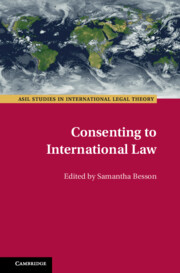Book contents
- Consenting to International Law
- ASIL Studies in International Legal Theory
- Consenting to International Law
- Copyright page
- Contents
- Contributors
- Preface
- Consenting to International Law
- Part I Notions and Roles of Consent
- Part II Objects and Types of Consent
- Part III Subjects and Institutions of Consent
- 11 The Consent of International Organizations in the Making of General and Conventional Rules of International Law
- 12 Consent and Informal Law-Making
- 13 Consent as a Guarantee of the Democratic Legitimacy of International Law
- 14 From Equal State Consent to Equal Public Participation in International Organizations
- 15 Autonomy in International Law
- Index
15 - Autonomy in International Law
About the Legal and Societal Limits to the Exercise of Consent
from Part III - Subjects and Institutions of Consent
Published online by Cambridge University Press: 23 November 2023
- Consenting to International Law
- ASIL Studies in International Legal Theory
- Consenting to International Law
- Copyright page
- Contents
- Contributors
- Preface
- Consenting to International Law
- Part I Notions and Roles of Consent
- Part II Objects and Types of Consent
- Part III Subjects and Institutions of Consent
- 11 The Consent of International Organizations in the Making of General and Conventional Rules of International Law
- 12 Consent and Informal Law-Making
- 13 Consent as a Guarantee of the Democratic Legitimacy of International Law
- 14 From Equal State Consent to Equal Public Participation in International Organizations
- 15 Autonomy in International Law
- Index
Summary
The author attempts to unravel the close conceptual and practical connection between consent and autonomy. The chapter argues that consent is the vehicle of autonomy, vehicle through which States give themselves their own rules, both primary rules and secondary rules. Because the exercise of autonomy in the international society faces contextual limits, linked to the self (auto) and to the law (nomos), it is claimed, that consent appears not only to be characterized by power, but also by limitations. This holds true for consent in international law-making as much as for consent in international dispute settlement. The chapter focuses on both categories, discussing the theory of sources and institutional law-making with respect to the former and jurisdictional matters and applicable law with respect to the latter. It concludes – prospectively – with some thoughts on the future of autonomy and consent in international legal theory and practice
Keywords
- Type
- Chapter
- Information
- Consenting to International Law , pp. 347 - 368Publisher: Cambridge University PressPrint publication year: 2023

